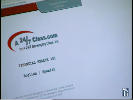A bankruptcy discharge releases the debtor from personal liability for certain specified types of debts. In other words, the debtor is no longer legally required to pay any debts that are discharged. The discharge is a permanent order prohibiting the creditors of the debtor from taking any form of collection action on discharged debts. The bankruptcy discharge varies depending on the type of case a debtor files: chapter 7, 11, 12, or 13. There are some debts that generally cannot be eliminated such as student loans, domestic support obligations, child support and alimony and some taxes. Click HERE for FAQs about the Discharge in Bankruptcy.
Watch this video about the Discharge:
Debtor Education - Required to Receive Discharge
The term "debtor education" generally refers to the instructional course in personal financial management in chapters 7 and 13 that an individual debtor must complete before a discharge is entered. This is a separate course, not to be confused with the pre-petition credit counseling requirement. While the credit counseling must take place before you file, the debtor education must take place after you file before the discharge can be entered.

